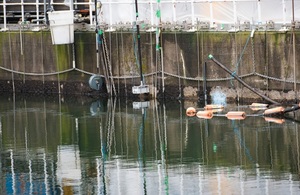- New Turing AI Fellowships are part of the government’s ambition to maintain the UK’s position as a world leader in AI and support ground-breaking innovations
- artificial intelligence (AI) that identifies cancer early is among 15 innovative and diverse projects backed by £20 million UK government cash injection
- other projects include assisting those who have experienced a serious illness or injury to communicate and processing data at lightning speed while lowering energy consumption
Discovering if people have cancer before it fully forms in the body so that they can be treated earlier is among the pioneering artificial intelligence (AI) research given a £20 million government cash boost today (Friday 27 November).
The prestigious Turing AI Acceleration Fellowships will give 15 of the UK’s top AI innovators the resources to drive forward their ground-breaking research from speeding up medical diagnosis to increasing workplace productivity. These pioneering projects could enable the UK to meet some of today’s most pressing challenges, such as reducing carbon emissions, while helping to transform industries across the UK economy, including healthcare, energy and transport.
Among the AI fellows being backed today is Professor Christopher Yau at The University of Manchester, who aims to use AI technology to predict the development of cancer before it has fully formed in the body and therefore improving on current methods. If successful, this ground-breaking technology will enable clinicians to track cancer more accurately and help them decide at an earlier stage what treatments patients require. This would increase the chances of saving lives as treatment is usually more successful when given earlier.
A range of other ground-breaking AI projects are set to benefit from this new support, including research into energy efficient data processing – which would support key sectors such as energy, healthcare and finance at a time when demand for data is growing exponentially. Additionally, the development of an “AI clinical colleague” could further support doctors by recommending the most effective drug prescriptions and doses for patients – and helping them decide the best course of action for recovery.
Science Minister, Amanda Solloway said:
The UK is the birthplace of artificial intelligence and we have a duty to equip the next generation of Alan Turings with the tools that will keep the UK at the forefront of this remarkable technological innovation.
The inspirational fellows we are backing today will use AI to tackle some of our greatest challenges head on, transforming how people live, work and communicate, cementing the UK’s status as a world leader in AI and data.
Digital Minister, Caroline Dinenage, said:
The UK is a nation of innovators and this government investment will help our talented academics use cutting-edge technology to improve people’s daily lives – from delivering better disease diagnosis to managing our energy needs.
The fellowships forms part of a major government investment in AI skills and research, including 16 Centres for Doctoral Training in AI and conversion courses to train the next generation of AI experts, announced by the Prime Minister Boris Johnson in October 2019.
Named after British AI pioneer Alan Turing, the £20 million fellowship scheme will be delivered by Engineering and Physical Sciences Research Council (EPSRC), part of UK Research and Innovation (UKRI), in partnership with the Alan Turing Institute and Office for Artificial intelligence.
It follows the publication of the government’s ambitious research and development roadmap in June this year, which committed to investing in ground breaking research and supporting the UK’s risk takers to scale up their innovations.
EPSRC Executive Chair Professor Dame Lynn Gladden said:
The Turing AI Acceleration Fellowships will support some of our leading researchers to progress their careers and develop ground-breaking AI technologies with societal impact.
By enhancing collaboration between academia and industry and accelerating these transformative technologies they will help to maintain and build on the UK’s position as a world leader in AI.
Notes to editors
Some of the Turing AI Acceleration Fellows receiving investment today are listed below.
Dr Antonio Hurtado, University of Strathclyde
Dr Hurtado aims to meet the growing demand across the UK economy to process large volumes of data fast and efficiently, while minimising the energy required to do so. His AI technology will use laser light, similar to those used in supermarket checkouts, to perform complex tasks at ultrafast speed – from weather forecasting to processing images for medical diagnostics. Being able to perform these tasks at lightning speed, with minimal energy consumption, could help to transform industries such as energy, healthcare and finance, improving efficiency, while helping the UK to meet its net zero ambitions by 2050.
Professor Aldo Faisal, Imperial College London
Professor Faisal aims to relieve the pressures and workload on doctors and clinicians by developing an ‘AI clinical colleague’, which will be able to recommend medical interventions such as prescribing drugs or changing doses in a way that is understandable to decision makers, such as doctors, helping to them to make the best final decision on a course of action for a patient. This technology will use ‘reinforcement learning’, a form of machine learning that trains AI to make decisions, and could be used in other regulated sectors such as aerospace or energy, where there is a need for decision-making support.
Professor Damien Coyle, Ulster University
Professor Coyle aims to develop AI technology that will be play a crucial role in new forms of wearable neurotechnologies – devices which measure signals from the brain and enable their wearer to interact with technology without movement. By enabling communication between the brain and computers that do not rely on movement, this technology could help those who are unable to communicate following a serious injury or illness.
Dr Jeff Dalton, University of Glasgow
Dr Dalton aims to improve the capabilities and performance of virtual personal assistants. Currently, virtual assistants on the market are only capable of limited conversations, and their development is expensive. Dr Dalton will build advanced information assistants that can work with users more effectively, including asking questions back and forth, explaining their reasoning more clearly, and helping to solve complex information tasks, for example explaining the causes of climate change.
Additional quotes
Dr Jeff Dalton, University of Glasgow said:
Being awarded the Turing AI Acceleration fellowship is an incredible honour and we are very excited by the opportunity to accelerate progress on the next generation of virtual assistants that will transform our economy and society.
This award is key in building a world-leading research group in Scotland with state-of-the-art deep-learning hardware for conversational AI that will enable us to perform large-scale experiments on real-world datasets to maximize impact.
Professor Christopher Yau, University of Manchester said:
I am very excited to have been awarded this Fellowship which will enable me to conduct ground-breaking research at the intersection of genomics and artificial intelligence. Genomics will yield unprecedented amounts of data which necessitate the use of AI for their interpretation.
I will be developing novel clinical information systems to provide cancer patients and clinicians with the very best genomics-guided personalised care to improve treatment effectiveness and survival rates. I am especially pleased to be working with a range of project partners, including Ovarian Cancer Action, to ensure that my research is conducted in partnership with patients.
The new Fellows will join a cohort of five Turing AI Fellows that have previously been awarded and the Turing AI World-Leading Researcher Fellowships due to be awarded in 2021. These fellowships are part of a major government investment in AI skills and research which also includes 16 UKRI Centres for Doctoral Training in AI announced by Prime Minister Boris Johnson.
The Turing AI Acceleration Fellowships are part of the government’s AI sector deal investment in Turing AI fellowships, recommended by the independent 2017 UK AI Review, whose report ‘Growing the artificial intelligence industry in the UK,’ was co-authored by Reguis Professor of Computer Science at Southampton, Dame Wendy Hall, and Jérôme Pesenti, now Vice President of AI at Facebook.
Applications were sought from a diverse pool of researchers to reflect the breadth of the AI ecosystem and a broad range of backgrounds and fields. Universities were required to use an inclusive approach in shortlisting their fellowship candidates and fellows will be required to do likewise in recruiting their research teams.
The Turing AI Acceleration Fellows are:
- Professor Damien Coyle, University of Ulster – AI for Intelligent Neurotechnology and Human-Machine Symbiosis
- Dr Jeff Dalton, University of Glasgow – Neural Conversational Information Seeking Assistant
- Dr Theo Damoulas, University of Warwick – Machine Learning Foundations of Digital Twins
- Professor Aldo Faisal, Imperial College – Reinforcement Learning for Healthcare
- Professor Yulan He, University of Warwick – Event-Centric Framework for Natural Language Understanding
- Dr Jose Miguel Hernandez Lobato, University of Cambridge – Machine Learning for Molecular Design
- Dr Antonio Hurtado, University of Strathclyde – PHOTONics for Ultrafast Artificial Intelligence
- Dr Per Lehre, University of Birmingham – Rigorous Time-Complexity Analysis of Co-evolutionary Algorithms
- Professor Giovanni Montana, University of Warwick – Advancing Multi-Agent Deep Reinforcement Learning for Sequential Decision Making in Real-World Applications
- Dr Christopher Nemeth, Lancaster University: Probabilistic Algorithms for Scalable and Computable Approaches to Learning (PASCAL)
- Dr Raul Santos-Rodriguez, University of Bristol – Interactive Annotations in AI
- Dr Sebastian Stein, University of Southampton – Citizen-Centric AI Systems
- Dr Ivan Tyukin, University of Leicester – Adaptive, Robust and Resilient AI Systems for the FuturE
- Dr Adrian Weller, University of Cambridge – Trustworthy Machine Learning
- Professor Christopher Yau, The University of Manchester – clinAIcan – Developing Clinical Applications of Artificial Intelligence for Cancer

